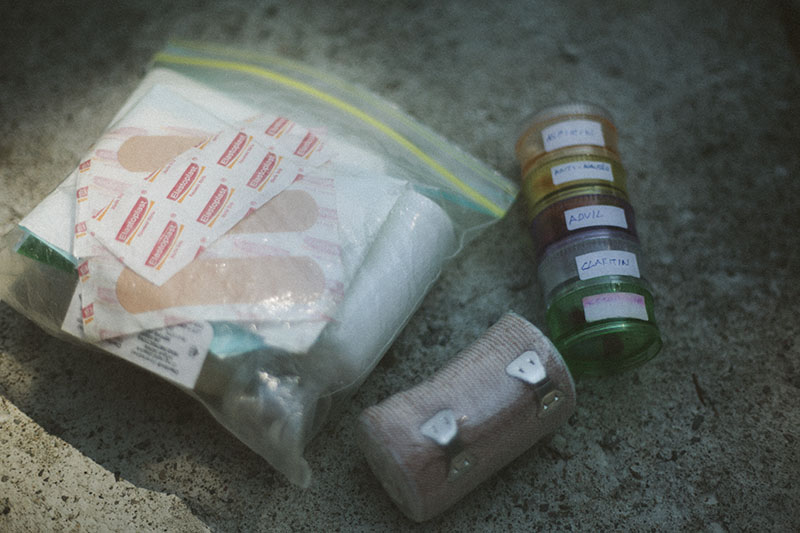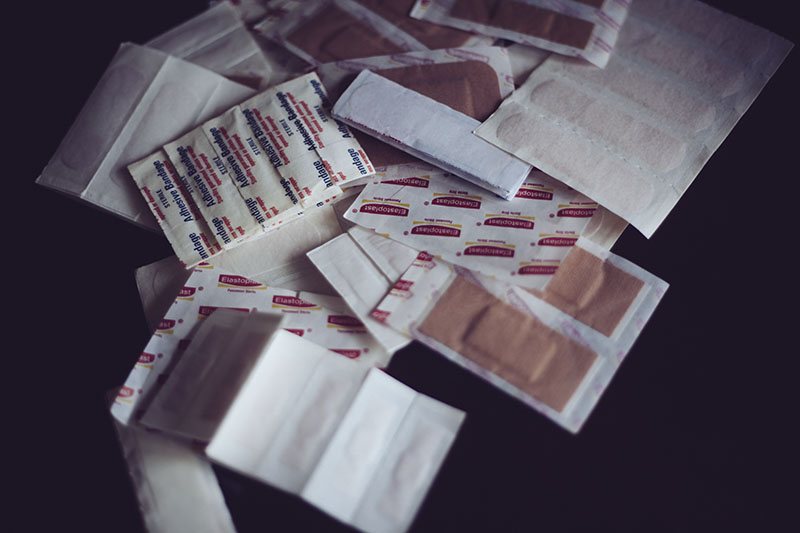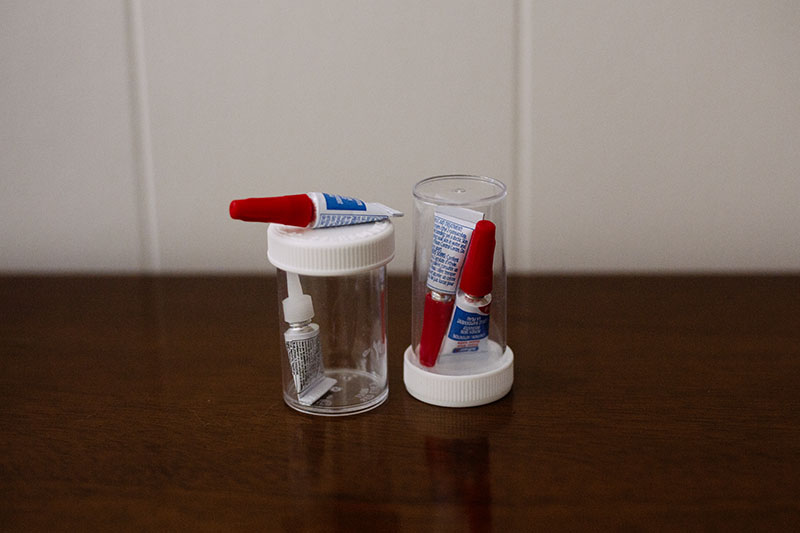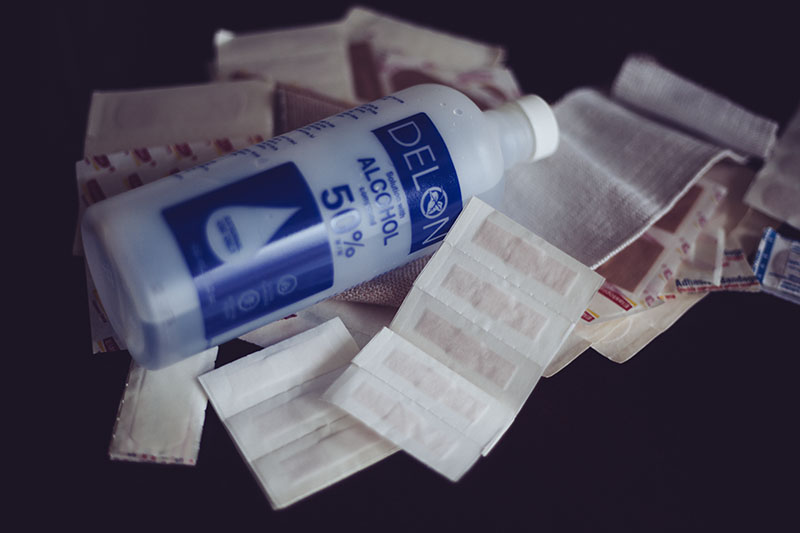Thanks to Thomas’ knowledge of first aid, we’ve accumulated a fairly decent number of guides and tutorials related to medicine and basic first aid on this blog.
As a survivalist and/or prepper, you won’t need convincing that one of the most important skills you can add to your arsenal for long-term survival is a good understanding of and skills related to both medicine and first aid. Knowledge and practical ability in these two fields I’m sadly sorely lacking in, yet they’re probably the highest on my list of talents I wish I could acquire quickly for having the maximal for peace of mind.

Yet the only way to build up knowledge and skill is one step at a time. Over time, through asking Thomas questions, researching (sadly not enough) on my own, and through reading what has been published on here about first aid, I do have a much better understanding of first aid principles and the basics of some medicines. We’re going to try to amp up the number of first aid articles on this blog over time because they’re honestly so useful, and some topics are rarely if ever written upon because of – well you know why – worry over accountability and the potential of being sued. You have to be very careful about how you word first aid conversation and recommendations. If your words aren’t chosen correctly, they can easily be misinterpreted and that can have dire consequences.
But if written carefully, the first aid advice passed on can be some of the most valuable life-altering information you come across, so as I said, we are going to try to amp up the number of articles on first aid we publish.
First, though, I thought I’d make it easier for those who want to go through what we’ve already got on here by making a single post you can reference now and in the future to find all our first-aid related tips and advice. As always, if there’s a topic we haven’t covered, let us know so we can write an article about it pronto! Always happy to cover information you guys want to learn more about. Now onto the articles we do have.

First Aid & Medical Supplies to Stock
The Ultimate First Aid Supplies List: Be Ready for Anything
A massive list filled with as many useful first aid supplies as we could think you might like to have at home. Not your ordinary first aid kit list, however, as there are plenty of items in this comprehensive article you may or may not want to stock at home. Excellent if you’ve already got a first aid kit or two and if you’ve already got an at-home stockpile of first aid supplies, but still want to make sure you’ve left nothing that may be useful out.
Education, Understanding, & Knowledge
Top 22 Emergency & Survival First Aid Books
Looking for a quick way to increase your knowledge of first aid over just a few months? Pick your favourites off this book list and read through them and you’ll have that covered. While it’s not the best way to develop skills when it comes to first aid, reading through books like these are definitely the best way to help you in the knowledge department – which I’d argue is the first step to developing skills. Gotta know what you’re doing first – before you try anything be sure.
General First Aid Precautions & Awareness
5 Steps to Assisting With Emergencies and Responding Well
Alright so you see an emergency situation unravel before your eyes, it’s got “first aid skills needed” written all over it, and you’re gearing up and ready to help. What should you do? Follow these 5 steps and you’ll be assisting the situation in the very best way possible.
The 3 Tiers of Triage When Dealing With Multiple Injuries
What do you do when there’s an emergency situation where multiple people are injured and you really want to help? Who do you take care of first, is there some sort of order to the madness you can find, a proper way to go through and handle everything until the paramedics get to you? Take a read through this article if this type of situation is one you want to be able to have under control.
4 Tips to Help First Aiders Stay Out of Legal Trouble
“I was just trying to help” is not enough reason to keep you out of legal trouble these days. Not only can first aiders do more harm than good, sometimes, even if they do good, if it’s not what the person under duress wanted, it’s not what should be done. If you want to help in emergency situations when it comes to first aid, there’s plenty you can do, but some things are better to do in certain situations than others. These tips will help you help, without getting into legal trouble afterward.
Cuts, Scrapes, & Adhesions
How to Properly Clean a Cut, Scrape, or Wound to Prevent Infection
Cleaning a cut so that you don’t end up contracting an infection from it is a basic first aid skill. Great place to start for beginners who are just starting off learning, but also a good refresher on the the dos and don’ts for those who may want or need one.
How to Tell If Your Cut Is Infected
Infected cuts are bad news, but is it easy to identify them? What does it look like when you just have a regular cut versus a cut that is actually infected? Are there specific signs you can look out for? Turns out there’s plenty to learn. If you think your cut is infected – please go to a hospital and get a medical practitioner to check it out for you as soon as you can. Don’t forget – doesn’t matter how small the original cut was, an infection is bad news and can become very serious.
Stitches, Bandages, or Super Glue?
So as you’ve already gathered from the article mentioned above, you can use super glue in specific cases to seal cuts. But which cases should you be using super glue and which cases should you be going straight to the hospital to get stitches for? And are there situations where super glue is no good compared to a bandage? There’s actually pretty clear cut times when you should be using each of these. Find out when by reading this article.
The Complete Guide to Using Super Glue for Cuts
Did you know you can use super glue to seal cuts? Not every cut is ideal to use super glue on, not every person should be using super glue to close their cuts (some people are very sensitive to super glue and feel a burning sensation when it’s applied), but as far as an unexpected medically beneficial item to have in a first aid kit or survival stockpile goes, this stuff is where it’s at. Learn all about super glue and cuts from this article.
The Rundown on Internal Bleeding
What feels like a really big topic that’s hard to grasp is actually simple enough to understand if you take the time to learn about it. Internal bleeding is not impossible to identify. Learn the symptoms, the most frequent causes, and what it feels like to have internal bleeding in order to have a better grasp of the concept and be able to minimize damage if it’s likely that you or someone you’re trying to help has it.

Medicine, Home, & Natural Remedies
Imodium’s Survival Applications: What It Is & Why Carry It Everywhere
Have you heard of Imodium before? Do you know what it does, what it’s useful for, and how it can really help you out in survival and emergency situation applications? One of our most popular first aid articles on this site for good reason – Imodium is rarely talked about because it’s misunderstood or not known about at all, even though it’s actually one of the most valuable medicines you can have in your medical stockpile.
I’m sure you know that there’s a difference between Advil, Tylenol, and Aspirin, but do you know what those differences are and which exactly you should be taking for the type of pain you have or may have in the future? Learn exactly which common painkiller does best in which situation so you don’t end up using one that doesn’t suit your ailment.
Maximum Recommended Dosage of Common Painkillers
Are the maximum recommended dosages of common painkillers the same as what’s written on the bottle? If there’s no way in hell you can get to a medical practitioner and you need more painkillers than the bottle recommends, should you be taking more or do you risk overdosing? This article takes a look at the most comment painkillers on the market – Aspirin (Acetylsalicylic Acid), Advil (Ibuprofen), and Tylenol (Acetaminophen) – and answers that question for you.
44 Home Remedies for Toothache Relief – Which Work for You?
Toothaches are terrible, and while they’re serious and need to be taken care of by a dentist, in the meantime (waiting for that appointment) you have to put up with the pain – or use some sort of toothache relief remedy that will take some of the edge off for you. If you’ve ever got a bad toothache, be sure to try out some of these home remedies. There should be quite a number that do the trick with things you already have in the pantry at home.
Guides on Specific Ailments
Dislocated Shoulders: Identifying Them & Popping Them Back In
Do you know what to do when someone has a dislocated shoulder? Chances are if it’s happened to someone before, it will happen to them again, and if this is the case with someone you personally know, you can easily prepare yourself by knowing in advance something or another about dislocated shoulders. Whether or not you want to pop someone’s dislocated shoulder back in yourself is not important, there are things you should be doing to minimize damage that absolutely anyone can do. Learn what they are here.
Hypothermia: Life Threatening, Yet Simple to Treat – Do You Know How?
We all know what hypothermia is, but how can it get to the point where it becomes life threatening and how can you take steps to prevent that from taking place? Learn about hypothermia’s symptoms, causes, how to treat it, and what never to do for a hypothermic individual, as well as how you can take steps to prepare in case you ever do need to take care of a hypothermic individual from this article.

Please let us know if there are any first-aid related subjects you’d like us to cover. You can do so either by contacting us or by leaving a comment down below. We love answering reader questions, so don’t hesitate to share your questions with us.
To take a look through other topics you might be interested in, click here.
My experience (and, of course, yours will be better). I had a cut problem. I used off-the-shelf super glue. Big mistake. Had to go to Kaiser. Was informed that there is a medical super glue that is used. Doesn’t need a prescription, but it is not the on-the-shelf stuff. I then bought some – about $25!
What was the ‘big problem’? Did it work on the cut? Who or what is Kaiser and why did you have to go there?
Kaiser is a health maintenance organization. It consists of multiple employee doctors and several hospitals. An insurance broker started it with Henry Kaiser when Kaiser was building the Hoover Dam in the 1930s.
The big problem would have been closing a cut when it needed to heal from the depth of the cut to the outer skin layer and the air. I had closed the cut completely with the off-the-shelf super glue and it would not heal
Thanks for the reply. That makes sense and thanks for the info about Kaiser….I feel a little bit smarter now.
You’re the first person I have “spoken” to who has had issues with standard super glue, I hope your cut healed up nicely without significant scarring, as you say- experiences vary (with everything). Outliers exist in science for a reason. What may work for some may not work for others etc.
Never heard of a cut not healing due to the bond being absolute over the cut. Eek.